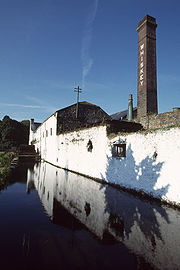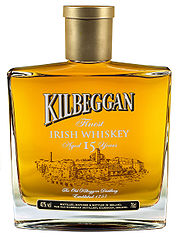
Kilbeggan Distillery
Encyclopedia

River Brosna
The River Brosna is a river in Ireland, flowing through County Westmeath and County Offaly.The river rises in Lough Owel north of Mullingar and is a tributary of the River Shannon. It meets the Shannon at Shannon Harbour.-Course:...
in Kilbeggan
Kilbeggan
-Geography:Kilbeggan is situated on the River Brosna, in the south of County Westmeath. It lies southeast of Lough Ennell, north of the boundary with County Offaly, about 9 kilometres north of Tullamore. Kilbeggan is surrounded by the gently rolling Esker Riada, the linear sand hills that stretch...
, County Westmeath
County Westmeath
-Economy:Westmeath has a strong agricultural economy. Initially, development occurred around the major market centres of Mullingar, Moate, and Kinnegad. Athlone developed due to its military significance, and its strategic location on the main Dublin–Galway route across the River Shannon. Mullingar...
, Ireland.
A small pot still
Pot still
A pot still is a type of still used in distilling spirits such as whisky or brandy. Heat is applied directly to the pot containing the wash or wine . This is called a batch distillation ....
distillery, The licence to distil dates to 1757; a copy of which can be seen in the distillery.
History
The distillery was founded in 1757 and, by 1798, was in the hands of Matthias McManus, whose son was executed in MullingarMullingar
Mullingar is the county town of County Westmeath in Ireland. The Counties of Meath and Westmeath Act of 1542, proclaimed Westmeath a county, separating it from Meath. Mullingar became the administrative centre for County Westmeath...
due to the part he played in the United Irishmen rebellion of that year.
John Locke took over the distillery in 1843, from when it remained in the hands of the Locke family for many years, being inherited by Mary Evelyn and Florence Emily, granddaughters of John Locke, in 1943. In 1947 the distillery was purchased by The Transworld Trust. This, together with the economic depression of the 1920s and 1930s, took its toll on Locke's and on 19 March 1954 production ceased, with the distillery closing completely in 1957.
Present day

Whiskey production recommenced in 2007, the year in which the distillery celebrated its 250th anniversary. Although the whiskey now in production at Kilbeggan will not be ready for sale until 2014, the three brands associated with the distillery—Kilbeggan, Locke's Blend and Locke's Malt—have, for many years, been made at the Cooley Distillery
Cooley (whiskey)
Cooley Distillery is an Irish whiskey distillery, located on the Cooley Peninsula in County Louth. It is the only independent Irish owned distillery in Ireland, converted in 1987 from an older potato alcohol plant by John Teeling....
in County Louth
County Louth
County Louth is a county of Ireland. It is part of the Border Region and is also located in the province of Leinster. It is named after the town of Louth. Louth County Council is the local authority for the county...
from where they are transported to Kilbeggan to be stored in a granite warehouse over 200 years old. In late 2009, the distillery released small '3-pack' samples of its still-developing "new make spirit" at 1 month, 1 year, and 2 years of age. (In Ireland, the spirit must be aged a minimum of three years before it can legally be called "whiskey.")
The distillery's visitor centre was amongst the nominations in Whisky Magazine's Icons of Whisky visitor attraction category in 2008.

